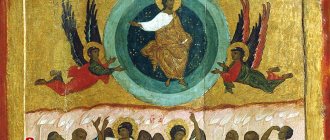"Save me, God!".
Thank you for visiting our website, before you start studying the information, please subscribe to our Orthodox community on Instagram, Lord, Save and Preserve † - https://www.instagram.com/spasi.gospodi/. The community has more than 60,000 subscribers. There are many of us like-minded people and we are growing quickly, we post prayers, sayings of saints, prayer requests, and timely post useful information about holidays and Orthodox events... Subscribe. Guardian Angel to you!
In church life there are various rituals and sacraments that are used very often and we have already become accustomed to them. Just like some church words become so familiar to us that we sometimes don’t even think about their meaning. Thus, many contradictions arise regarding the use of such an expression as “servant of God.” Some believe that such a statement degrades human dignity. But before jumping to hasty conclusions, it’s worth understanding why parishioners are called servants of God.
Why do they say servant of God
In order to get away from insults and insults, you should not borrow legal or social concepts and transfer them to interpretations of higher reality. Our spirituality should be free from worldly concepts. The Lord's main goal is to lead everyone to eternal life. If human nature is damaged by sin, then he must not only believe in God, but also completely and completely follow his good will.
The best article for you, go to: Is it possible to wear someone else’s cross?
It is in the Holy Scriptures that it is said about such a person that if he renounced his sinful thoughts and actions and surrendered to the saving will of the Lord, then he is called a “servant of God.” In biblical texts this name is of an honorary nature.
There are several interpretations of what a servant of God or servant of God means:
- In Judea, the word “slave” did not carry a pejorative meaning in its context. It simply meant worker.
- The main task of the Lord is to desire only good things for us and to lead us to perfection. It is the submission of his will that has nothing humiliating in it.
- The emotional component of this phrase should draw our attention to the degree of trust in the Lord and our faithfulness to him. We should not turn to it only when necessary and in difficult times.
- It is also necessary to remember the historical features of the time when slave ownership existed. There were only slaves and their mercenaries. But in this case, the “slave” is not a creature without rights.
- Why a servant of God and not a son of God? They believe that the relationship between the Lord and man must go through certain stages of development: slave, mercenary and son. This classification is found in the parable of the prodigal son.
The best article for you, go to: Archpriest Andrei Tkachev: biography, books, lectures, sermons
Social and spiritual slavery
Any slavery means a restriction of freedom in a person, in his entire being. The concepts of social and spiritual slavery are very different, but they are also related. These concepts are quite simple to consider through the prism of earthly wealth or financial well-being, in modern terms.
Slavery of earthly riches is heavier than any suffering. Those who have been honored to be freed from it are well aware of this. But in order for us to know true freedom, it is necessary to break the bonds. It is not gold that should be kept in our house, but what is more valuable than all worldly goods—philanthropy and almsgiving. This will give us hope for salvation, liberation, and gold will cover us with shame before God and will largely contribute to the influence of the devil on us.
As the church explains
Many clergy say that the emphasis in the phrase “servant of God” should be placed on the second word. If you belong to the Lord, then you cannot be anyone else’s. To become a servant of God means to gain incredible freedom. “Slavery” to the Lord is also considered a greater measure of freedom than slavery to one’s passions and stereotypes.
So there is no need to attach special importance to such sayings. The most important thing is faith in the Lord and following the commandments of the Lord.
The Lord is always with you!
Slavery and freedom
God's most precious gift to man, the gift of love, is freedom. Of course, the religious experience of freedom is so unknown and difficult to people, just as the experience of the law is simple. Modern humanity without Christ still lives like the ancient Jews under the yoke of the law. All modern state laws are a reflection of natural laws. The most insurmountable slavery, the strongest shackles, is death.
All human liberators, rebels, ardent rebels remain only slaves in the hands of death. It is not given to all the imaginary liberators to understand that without the liberation of a person from death, everything else is nothing. The only person among humanity who rises to death is Jesus. Just as “I will die” is natural and normal for each of us, for him it is “I will be resurrected.” He was the only one who felt the strength in himself necessary to defeat death by death both in himself and in all of humanity. And people believed it. And, although not many, will believe until the end of time.
The Role of Women in the New Testament
“Behold, the servant of the Lord. Let it be done to me according to your word” (Luke 1:28-38). With these words, the Virgin Mary humbly answers the angel who brought her the news of the future birth of the son of God. And so, for the first time in the history of mankind, the concept of “servant of God” appears. Who, if not the Virgin Mary, blessed among women, is destined to be the first to accept this great spiritual title? The Mother of God is glorified throughout the Christian world. Following the Mother of God is the servant of God Elizabeth, who immaculately conceived John the Baptist.
A striking example of this title are those who came to the Tomb of the Lord on the day of the Resurrection of Jesus Christ with incense and aromas for the ritual anointing of the body. Historical examples confirming the humility and faith of truly Christian women are also found in modern history. Nicholas II's wife Alexandra Feodorovna and his daughters are canonized.
Slavery in the Bible
Photo: Flickr.com
In the Old Testament, among the Jews, a slave was not powerless, but a friend, servant, confidant and, even if the owner did not have a son, his heir. For example, Abraham had a slave named Eliezer, who is described in Scripture as “a member of the family” (Genesis chapter 15, verses 2-3). In addition, Abraham entrusted Eliezer with a high mission: finding a bride for his son. He provided the slave with a caravan of camels, gave him jewelry and other gifts for his son's future wife, and provided him with food and clothing. Eliezer could have run away from his master, but he completed an important task.
In the book of Solomon's Proverbs we read:
“A wise servant will rule over a dissolute son, and he will divide the inheritance among his brothers” (chapter 17, verse 2).
From these words it follows that the head of the family could transfer a share of the inheritance of his children to a conscientious and decent slave if the latter was unworthy.
The Law of Moses prohibited lifelong slavery:
“If you buy a Jewish slave, let him work for six years; and on the seventh, release him. If he came alone, let him go out alone. And if he is married, let his wife go out with him” (Exodus, chapter 21, verses 2-3).
Use of the term in worldly life
Despite the fact that every Christian considers himself a servant of God, calling himself that in everyday life is undesirable on the advice of Orthodox priests. Not that this is blasphemy, but, as we have already discussed above, every Christian should treat this epithet with reverent respect and joy. This must live in the heart of a believer. And if this is really so, then no one will prove anything to anyone and declare it to the whole world.
The appeals “comrade” during Soviet times or “gentlemen” during Tsarist Russia are clear and natural. The conversion and utterance of the words “servant of God” should take place in an appropriate place for this, be it an Orthodox church, a monastery cell, a cemetery, or just a secluded room in an ordinary apartment.
The third commandment is strictly forbidden to take the name of the Lord in vain. Therefore, the pronunciation of this epithet is unacceptable in a comic form or as a greeting and in similar cases. In prayers for health, for repose and others, after the words “servant of God,” the name of the person praying or the one asked for in prayer should be written or pronounced. The combination of these words is usually either heard from the lips of the priest, or pronounced or mentally read in prayers. After the epithet “servant of God,” it is advisable to pronounce the name in accordance with the church spelling. For example, not Yuri, but Georgy.
Slaves in the Kingdom of Heaven
Despite human sinfulness and the desire to take a dominant place in the universe, Christ once again shows his mercy and love for mankind, taking on the image of a servant, being at the same time the Son of the Lord God. It destroys our entrenched, erroneous stereotypes of greatness and power. Christ tells his disciples that the one who wants to be great will become a servant, and the one who wants to be first will be a slave. “For even the Son of Man came not to be served, but to serve, and to give His life as a ransom for many” (Mark 10:45).
New in blogs
Written specifically for the reference and information portal “Vozglas” vozglas.ru
I. Kramskoy. Christ in the desert. Painting from 1872.
I thought, why, calling ourselves “servants of God,” in the prayer “Our Father,” do we address God as Father?
Strange? So are we slaves of the owner of the world - God, or are we still His...children, in the sacred reality of the Lord's Prayer?
I'm in the posts Who needs slaves ... and Who needs slaves... Ch II has already considered this issue, but rather as an alternative view of the traditional understanding of these sacred relationships (man and God).
In fact, today the question is posed in a fundamentally different plane and a different historical retrospection.
So, I’ll try to figure it out (although I don’t pretend to have a final solution to this problem, especially since the ancient tradition (which has a completely rational explanation) is much stronger than common sense), especially since some ancient phrases of the Church become so authentic for their “carriers” (installed in the mentality) that simply lose their historical retrospectiveness (and in reality , simply lose the meaning of what they meant in the past).
The fact is that the word “servant of God” dates back to the times of the so-called slave system (period) of human history. Indeed, those researchers are right when they say that in those distant times the word “slave” simply did not have the negative connotation that it took on in the New History of Mankind (the Age of Enlightenment + the humanistic movement of the Renaissance). Let me note that the Renaissance was a return to the “roots” (all the favorite Renaissance antitheses between “darkness” and “light”, “sleep” and “awakening”, “blindness” and knowledge”, which served to distinguish the “New Age” from the medieval, were borrowed, strange as it may seem, from the Holy Scriptures. And the very term “Renaissance”, by analogy with birth, enlightenment, awakening, the thinkers of that time derived from the Gospel conversation of the Lord Jesus Christ with Nicodemus: “Jesus answered him: Truly, truly, I say to you: unless someone is born (according to one version, he is “reborn” from above), he cannot see the Kingdom of God.” (John 3:3)
It is clear that due to elementary conservatism and a certain archaic nature of religious forms of divine knowledge + cult practice, an intellectual confrontation arose between Enlightenment thinkers and clerics. It is necessary to clearly realize that at that time there was REALLY a clerical society + a worldview that determined absolutely all forms and meanings of human life and elementary life. It is natural that the princes of the Church (as a rule, the most powerful and rich people of that time) saw in this movement not only an encroachment on the “divinely established”, centuries-old world order + personal wallet, but also an intellectual temptation to raise Man to the “Olympic” pedestal. The most powerful intellectuals of the Church thought about the second topic. Historically, their fears came true with... absolute accuracy (but that's another topic).
I'll be back. Let us not forget that in those days, during the secular-feudal fragmentation, the core cementing the Western Empire was the Catholic Church. Subsequently, it was precisely thanks to this fact that a powerful church force arose that gave birth to the papacy = the viceroy of God on earth (during the slave period) as an institution of the Church. If I may, this was a unique model of power over people and in absolute social terms - a slave and a sovereign Master (a kind of earthly god with full power to execute and pardon). One figure is Gregory VII (although I have a certain respect for his person), his reforms (celibacy, abolition of simony, centralization of power, etc.) and the struggle for investiture with Emperor Henry IV, which ended in the defeat of the latter ( Henry IV brought repentance in Cannos in rags ), cannot but cause amazement at this amazing, but in spirit, antagonistic phenomenon - the entry of the Church in its entirety into the world. At the behest of the pope, entire nations, taking the sword and the cross, fight against those whom the pope points out. “I myself am the emperor,” Pope Boniface VIII ended his speech in 1300, appearing at the celebration in imperial robes, where two swords were carried in front of him as a sign of his spiritual and temporal dominion over the universe. In the 13th century and later, popes not only distributed royal crowns to those whom they considered most worthy, but also intervened in the internal politics of independent states, deposing kings and emperors. And they even allowed their subjects to take the oath given to the kings.
At the same time, the objective contradiction inherent in Christianity itself could not but affect these historical conditions with all its force. It is about “the fundamental instability between the Church and the world, between the kingdom of God and fallen man.” The Church enters the world, historically remains in it, but Itself is not of the world. The Church always talks about the future parousia (that is, about the Eschaton, the global liberation of man from real slavery), testifies to a deified humanity free in Christ. The Church is in the world, but overcomes the world, which the most religiously sensitive souls (elders, confessors, mystics and ascetics) have always felt. When you read about how figures of the Renaissance and Enlightenment trolled the Catholic Church at all costs, you understand that they had very serious and real reasons for this (although criticism of the Roman clergy began much earlier). “The priests ran butcher shops, taverns, gambling houses and brothels, so much so that they had to repeatedly issue decrees prohibiting priests “to become pimps of prostitutes for the sake of money,” but all in vain. The nuns read the Decameron and indulge in orgies, and children’s skeletons are found in dirty drains as a consequence of these orgies. Writers of that time compared monasteries either to dens of robbers or to obscene houses. Thousands of monks and nuns live outside the monastery walls. What can we say about monks, when people like Pope Alexander VI, being a cardinal, had four illegitimate children from the Roman woman Vannotsi, and a year before his accession to the papal throne, already being a 60-year-old man, he entered into cohabitation with 17-year-old Julia Farnese, with whom he soon had a daughter, Laura. Pope Pius II, Pope Paul III, Pope Innocent VIII, Pope Julius, and Pope Paul III also had illegitimate children; Moreover, what is interesting is that all of them are humanist popes, famous patrons of the Renaissance arts and sciences. Pope Clement VII was himself the illegitimate son of Giuliano de' Medici. Many cardinals maintained relationships with the famous courtesan of the Empire, whom Raphael depicted in his Parnassus in the Vatican. Moral corruption at this time reached terrifying proportions. In 1490 there were 6,800 prostitutes in Rome, and in Venice in 1509 there were 11 thousand. In Germany, people began to engage in this craft at the age of 12. At this time, palmistry, physiognomy, witchcraft, Satanism, occultism, and astrology bloom in full bloom. When in the 16th century the Medici restored their dominance in Florence (the cradle of the Renaissance), their entire subsequent history was marked by murders, conspiracies, and atrocities. Among them, the son of the Pope, Caesar Borgia, became especially famous for some kind of absolute Satanism. On his conscience is a huge number of brutally tortured souls” (A.F. Losev “Aesthetics of the Renaissance” M. 1998. “Thought”. P. 122-136)
"Servant of God"
Biblically and textologically, the word “servant of God” dates back to the time of the exodus from Egypt. As Andrei Okhotsimsky rightly notes: “In the book of Leviticus 25:55 the Lord speaks of the children of Israel: “They are My servants, whom I brought out of the land of Egypt.” Here we are talking not only (I would say not SO MUCH - my comment) about dependence on God, but also about liberation from human slavery: we were slaves of the Egyptians - now only My slaves.”
This is a fundamental point. If I may, God speaks to the people of that slaveholding time, when any other semantic verbalization would simply not be understood. How would it not be understandable for a modern preacher to address contemporary people (assuming that Christ has not yet appeared to the world) with the words: “Listen to me! Slaves..." There is a rational grain in this. Meanings were met and you will understand everything. Now, it is somewhat difficult to realize that so many heads fought over these simple and now self-evident words: about the meaning and meaning of man. And then, Christ was crucified for man! Man is a value in the eyes of God. Moreover, it was so serious that it did not happen without the shedding of divine blood.
“The prophet Nehemiah calls the Israelites servants of God in his prayer (Neh. 1:10), which again is dedicated to liberation - this time from the Babylonian captivity. Prophets are also called servants of God (2 Kings 24:2), and from the context it is clear that this emphasizes their independence from secular authority. The psalmist repeatedly calls himself a servant of God (Ps. 116:7, 118, 134). In the book of the prophet Isaiah, the Lord says to Israel: “You are my servant. I have chosen you and will not reject you” (Isaiah 41:9). The apostles call themselves servants of God (or servants of Christ) (Rom. 1:1, 2 Peter 1:1, James 1:1, Jude 1:1), and this sounds like an honorary title, a sign of election and apostolic authority. The Apostle Paul calls all Christian believers servants of God. Christians have been “freed from sin and become slaves of God” (Rom. 6:22), with “freedom of glory” (Rom. 8:21) and “eternal life” (Rom. 6:22) awaiting them. For the Apostle Paul, slavery to God is synonymous with liberation from the power of sin and death,” continues Andrei Okhotsimsky (see https://www.vladhram-uspenie.ru/ “The servant of God - why “slave”?”).
It is interesting in this sense to quote the great Saint. Theophan the Recluse: “Slavery was widespread in the ancient world. St. Paul did not rebuild civil life, but changed human morals. And therefore he takes civil orders as they are, and puts into them a new spirit of life. He leaves the external as it was established, but turns to the internal, and gives it a new order. The transformation of the external came from within, as a consequence of the free development of spiritual life. Remake the internal, and the external, if it is absurd, will fall away by itself” (St. Theophan the Recluse. Interpretation of the Epistle of St. Apostle Paul to the Ephesians. M., 1893.)
So, we can draw several preliminary conclusions (it is clear that the zealots will not like these conclusions very much, but I already wrote above about the fundamental inability of some people to use common sense + see... History) that:
a) the phrase “servant of God” was used in the slaveholding period (archaic), as understandable to the ear of the person of that time.
b) the phrase “servant of God” is authentic only for the slave-owning system and its socio-legal system.
c) the current use of the phrase “servant of God” is a tribute to a tradition that has no real socio-cultural and state-legal basis. It is not even a symbol, since a symbol still reflects the reality hidden behind it.
d) since in the modern world, slavery has an extremely negative, demonic-semantic connotation, its use (even under the “pious” roof of the “divine” tradition) can be: 1) authentic only for followers of the slave-owning mentality; 2) abolished for lack of sociocultural soil + the general social mental model of modern man.
(to be continued …)
https://vozglas.ru/blogs/Religion/rab-bozhiy-ili-syn-bozhiy-opyt-postroeniya-russkoy-teologii-osvobozhde.php
P/S.
In the ancient Church, “already Clement of Alexandria (+215), under the influence of the Stoic ideas about universal equality, believed that in their virtues and appearance slaves were no different from their masters. From this he concluded that Christians should reduce the number of their slaves and some jobs do it yourself. Lactantius (+320), who formulated the thesis about the equality of all people, demanded that Christian communities recognize marriage among slaves. And the Roman Bishop Calistus the First (+222), who himself came from the class of unfree people, even recognized relationships between high-ranking women - Christians and slaves, freedmen and freeborns as full-fledged marriages. In the Christian environment, since the time of the primacy of the Church, the emancipation of slaves has been practiced, as is clear from the admonition of Ignatius of Antioch (+107) to Christians not to abuse freedom for unworthy purposes. However, the legal and social foundations of the division between free and slave remain unchanged. Constantine the Great (+337) does not violate them either, who, undoubtedly, under the influence of Christianity, gives bishops the right to free slaves through the so-called announcement in the church (manumissio in ecclesia) and publishes a number of laws easing the lot of slaves. In the 4th century, the issue of bondage was actively discussed among Christian theologians. So the Cappadocians - Basil, Archbishop of Caesarea (+379), Gregory of Nazianzus (+389), and later John Chrysostom (+407), relying on the Bible, and perhaps on the teaching of the Stoics about natural law, express an opinion about the heavenly reality, where equality reigned, which, as a result of the Fall of Adam... was replaced by various forms of human dependence. And although these bishops did a lot to alleviate the plight of slaves in everyday life, they vigorously opposed the general abolition of slavery, which was important for the economic and social structure of the empire. Theodoret of Cyrus (+466) even argued that slaves have a more guaranteed existence than the father of the family, who is burdened with worries about his family, servants and property. And only Gregory of Nyssa (+395) opposes any form of human enslavement, since it not only tramples the natural freedom of all people, but also ignores the saving work of the Son of God... In the West, under the influence of Aristotle, Bishop Ambrose of Milan (+397), justifies legitimate slavery, emphasizing the intellectual superiority of the masters, and advising those who, by war or accident, were unjustly enslaved, to use their position as a test of virtue and faith in God. Augustine (+430) was also far from the idea of challenging the legitimacy of slavery, for God does not free slaves, but makes bad slaves good. He sees the biblical and theological justification for his views in Ham’s personal sin against his father Noah, because of which all of humanity was condemned to slavery, but this punishment is also a healing remedy. At the same time, Augustine also refers to the teaching of the Apostle Paul about sin, to which everyone is subject. In the 19th book of his treatise “On the City of God,” he paints an ideal image of human coexistence in the family and state, where slavery takes its place and corresponds to the plan of God’s creation, earthly order and natural differences between people” (Theologische Realenzyklopaedie. Band 31. Berlin – New-York, 2000. S. 379-380).
PP/S.
“Slavery appears with the development of agriculture approximately 10,000 years ago. People began to use captives in agricultural work and forced them to work for themselves. In early civilizations, captives long remained the main source of slavery. Another source was criminals or people who could not pay their debts. Slaves as a lower class were first reported in the written records of the Sumerian civilization and Mesopotamia about 3,500 years ago. Slavery existed in Assyria, Babylonia, Egypt and the ancient societies of the Middle East. It was also practiced in China and India, as well as among Africans and Indians in America. The growth of industry and trade contributed to an even more intensive spread of slavery. There was a demand for labor that could produce goods for export. And therefore slavery reached its peak in the Greek states and the Roman Empire. Slaves performed the main work here. Most of them worked in mines, handicrafts or agriculture. Others were used in the household as servants and sometimes as doctors or poets. Around 400 BC. slaves made up a third of the population of Athens. In Rome, slavery became so widespread that even ordinary people owned slaves. In the ancient world, slavery was perceived as a natural law of life that has always existed. And only a few writers and influential people saw evil and injustice in it” (The World Book Encyclopedia. London-Sydney-Chicago, 1994. P. 480-481. See for more details the large article “Slavery” in: Brockhaus F.A., Efron I. A.. Encyclopedic Dictionary. T. 51. Terra, 1992. P. 35-51). https://minds.by/article/91.html










